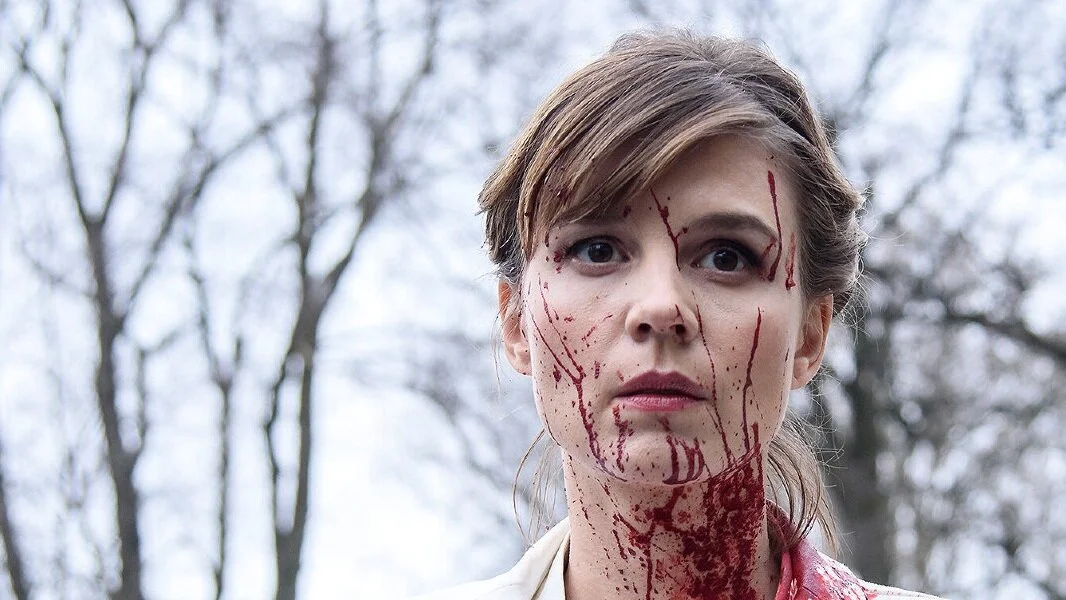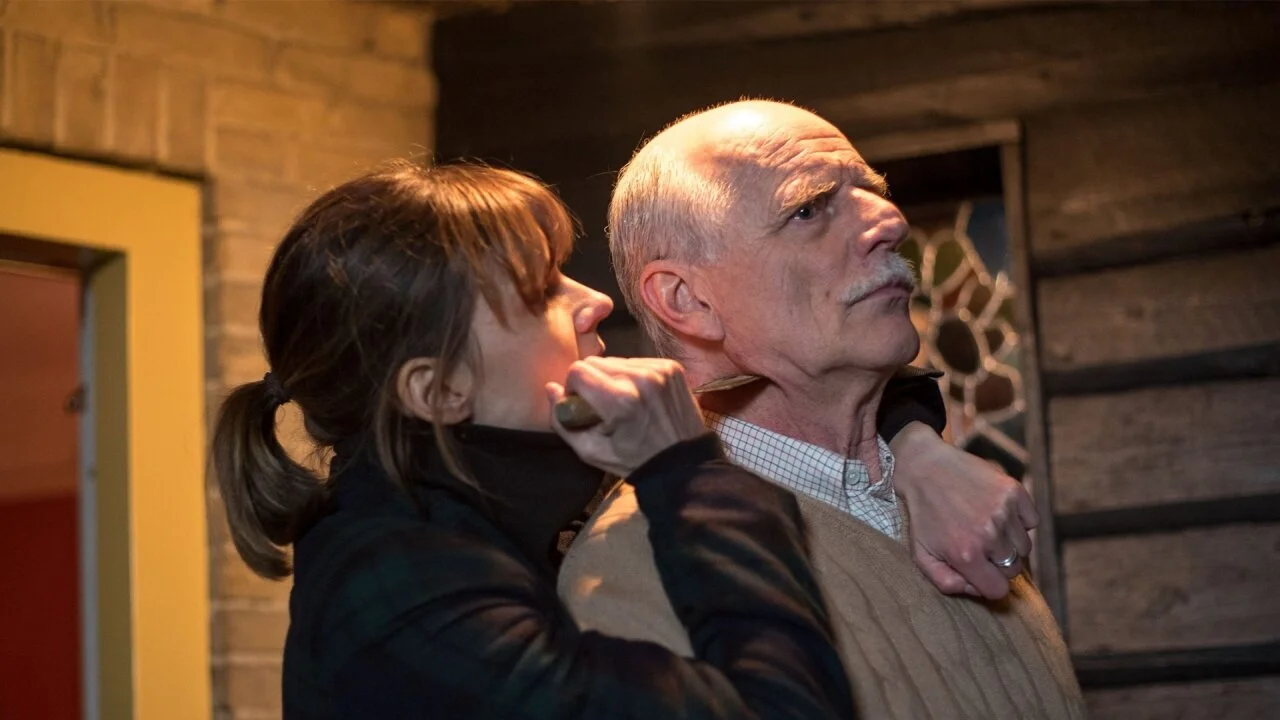[Film Review] The Columnist (2019)
Femke Boot (Katja Herbers) is a writer with a book launch on the way. Her publisher advises her that people like her work because it is ‘familiar’ not because it ‘tells them what to think’. The film begins with a nervous looking Femke (Katja Herbers) sitting alone in a tv studio while pockets of people interact happily around her.
She is isolated whilst being surrounded. ‘Twitter Is it a blessing or a curse?’ is the question posed by the host and thus we are launched into an arena of complicated debate. Being vocal and opinionated runs in the family as Femke’s politically switched-on daughter Anna (Claire Porro) campaigns on the issue of freedom of speech.
Twitter inspires great anger in Femke but she cannot stop looking. The opinions of posters soon snowball into threats and, at the end of her tether, she bids ‘goodbye forever’ with a farewell tweet. Despite this, she continues to peer into the murky world on a regular basis and spots a hateful and intolerant comment from her neighbour who incidentally is building a (symbolic) fence between the two properties. Sitting in the changing room of a high street fashion store whilst staring at her screen frustrated, the assistant’s words: ‘just a minute - this isn’t the medium’ strike a meaningful chord. It’s no exaggeration to say that The Columnist explores some of the most prescient topics of our time; difference of opinion, treatment of people as brands and commodities, freedom of speech, horror and violence being a positive outlet (as long as it doesn’t hurt anyone) and judging only what we see or are shown rather than the entire picture - which is something we are rarely given access to.
Femke is relatable, particularly to myself as a writer who has also sat behind many a blank white screen, staring at nothing but a pulsating cursor which feels like a slap-in-the-face reminder that you have nothing interesting to say. Rather than try to work, she peeps back into the world of Twitter where she finds plenty of people ready to comment on all aspects of her life. A visit to the Police station to report slander and death threats yields no results as the officer likens this to bullying and minimises her experience: ‘it's just the internet, it's not real’. We also see the numerous tweets appear above her head as she shops in her local supermarket - an illustration of how toxicity sits in our brains and how comments can linger in our thoughts during mundane tasks. Meanwhile, the local community watch as they hear news bulletins about an unstoppable ‘Middle Finger Killer’.
The attention-seeking cursor continues to flash as the rumbling sounds (evocative of a vibrating mobile phone and to the idea of constant notifications pinging) are just one factor in preventing her from meeting deadlines. Bored and procrastinating, Femke looks deeper into her neighbours’ social media and happens upon an Islamophobic comment which pushes her over the edge. We watch in total support as she takes her revenge and birds begin to tweet while she stands victoriously. It’s around this time that Femke begins a relationship with Steven Dood (Bram van der Kelen), a mild-mannered horror writer who enjoys cooking and for a moment it looks as though the writer has found happiness and fulfilment. However, Femke continues on her dangerous journey which sees her turn the tables of justice on those who sit behind their laptops apathetically. This new pastime has a revitalising effect on Femke’s writing and soon she gets her word count up and is writing about the ‘Joys of Soft- Boiled Eggs’. This is a turn in tone for Femke who previously wrote on such contentious political topics but switching to a gentler, more ‘familiar’ subject does nothing to calm her disparaging readership who continue to berate her.
Accusations towards her become more and more absurd and we find that Femke’s office is receiving threats about something in her past which has been overblown and misunderstood. In one disturbing scene, rather than taking the predictable action of dismissing Femke, the publishing house proposes using the threats in order to ‘create a stir’ about her forthcoming book. Femke knows that she ought to stop looking on social media, but she can’t resist it and, in this respect, she speaks to the curiosity in all of us, if we are ready to admit it. Essentially, Femke crosses a line early on into the film but Herbers and Aart ensure that we are beside the central character cheering her on the whole time.
Eventually, the Police arrive on Femke’s doorstep but it’s not for the reason she (or we) think. Instead, they treat a wild claim made about her with total seriousness which contrasts with the lack of weight given to her earlier request for help. As Femke gets more and more caught up in her campaign for ‘kindness’, Aart does not overlook her relationships with Anna and Steven. In a heart sinking moment when she lets Anna down, the throwaway remark: ‘you hung up on me’ takes on a deeper significance. The final segment of the film offers some fantastic twists and one of best lines I’ve heard recently: ‘I accuse you of being a serial killer and you make carbonara’ However, nothing can be topped by a visual and impactful finale that won’t leave you disappointed.






![[Film Review] V/H/S/85 (2023)](https://images.squarespace-cdn.com/content/v1/5fe76a518d20536a3fbd7246/1697455043249-K64FG0QFAFVOMFHFSECM/MV5BMDVkYmNlNDMtNGQwMS00OThjLTlhZjctZWQ5MzFkZWQxNjY3XkEyXkFqcGdeQXVyMTUzMTg2ODkz._V1_.jpg)
![[Film Review] It Lives Inside (2023)](https://images.squarespace-cdn.com/content/v1/5fe76a518d20536a3fbd7246/1695481592448-F02OEXVFEXA4VA5NVU7W/Screenshot_2023-06-29_at_18.21.41.width-800.png)
![[Film Review] A Wounded Fawn (2022)](https://images.squarespace-cdn.com/content/v1/5fe76a518d20536a3fbd7246/1695484054446-7R9YKPA0L5ZBHJH4M8BL/Screenshot+2023-09-23+at+16.42.24.png)
![[Film Review] Mercy Falls (2023)](https://images.squarespace-cdn.com/content/v1/5fe76a518d20536a3fbd7246/1695482997293-E97CW9IABZHT2CPWAJRP/Screenshot+2023-09-23+at+16.27.27.png)
![[Film Review] Somewhere Quiet (2023)](https://images.squarespace-cdn.com/content/v1/5fe76a518d20536a3fbd7246/1695482215451-2E146A1AFUFSWT5IZD1K/Screenshot+2023-09-23+at+16.10.43.png)
![[Film Review] Kill Your Lover (2023)](https://images.squarespace-cdn.com/content/v1/5fe76a518d20536a3fbd7246/1697465940337-T55VQJWAN4CHHJMXLK32/56_PAIGE_GILMOUR_DAKOTA_HALLWAY_CONFRONTATION.png)
![[Film Review] Perpetrator (2023)](https://images.squarespace-cdn.com/content/v1/5fe76a518d20536a3fbd7246/1695483561785-VT1MZOMRR7Z1HJODF6H0/Screenshot+2023-09-23+at+16.32.55.png)
![[Film Review] Elevator Game (2023)](https://images.squarespace-cdn.com/content/v1/5fe76a518d20536a3fbd7246/1696440997551-MEV0YZSC7A7GW4UXM5FT/Screenshot+2023-10-04+at+18.31.42.png)
![[Film Review] Shaky Shivers (2022)](https://images.squarespace-cdn.com/content/v1/5fe76a518d20536a3fbd7246/1696442594997-XMJSOKZ9G63TBO8QW47O/Screenshot+2023-10-04+at+18.59.33.png)
![[Film Review] The Nun 2 (2023)](https://images.squarespace-cdn.com/content/v1/5fe76a518d20536a3fbd7246/1695482684013-4AE3W8UZRPJOKQSGF2EA/Screenshot+2023-09-23+at+16.19.06.png)
![[Film Review] Homebodies (1974)](https://images.squarespace-cdn.com/content/v1/5fe76a518d20536a3fbd7246/1695479270571-LPYQVK2QNA8DWZ44R6ZB/Screenshot+2023-09-23+at+15.25.28.png)

![[Editorial] 10 Films & Events to Catch at Soho Horror Film Fest 2023](https://images.squarespace-cdn.com/content/v1/5fe76a518d20536a3fbd7246/1700819417135-299R7L4P0B676AD3RO1X/Screenshot+2023-11-24+at+09.41.52.png)
![[Mother of Fears] Mother Vs. Monster in Silent Hill (2006)](https://images.squarespace-cdn.com/content/v1/5fe76a518d20536a3fbd7246/1695485781119-H6GNP0G3J2TLPAOIABV7/Screenshot+2023-09-23+at+17.11.56.png)
![[Editorial] 5 Female Focused Horror Book Recommendations](https://images.squarespace-cdn.com/content/v1/5fe76a518d20536a3fbd7246/1696441981361-52EQCTJ7AT2QF1927GM7/919xtm6d3fL._AC_UF894%2C1000_QL80_.jpg)
![[Editorial] 9 Best Slashers Released Within 10 Years of Scream (1996)](https://images.squarespace-cdn.com/content/v1/5fe76a518d20536a3fbd7246/1695478839037-LOFHGVM3H6BMSZW7G83M/Screenshot+2023-09-23+at+15.15.11.png)
![[Editorial] 9 Terrifying Cerebral Visions in Horror Movies](https://images.squarespace-cdn.com/content/v1/5fe76a518d20536a3fbd7246/1693509801235-X23OL50T1DVGECH0ZJK2/MV5BMjQ0MTg2MjQ4MV5BMl5BanBnXkFtZTgwMTU3NDgxMTI%40._V1_.jpg)
![[Mother of Fears] I Don’t Wanna Be Buried in a Pet Sematary (1989) and (2019)](https://images.squarespace-cdn.com/content/v1/5fe76a518d20536a3fbd7246/1691328766069-QFNAVJOMFZVZ5CLU1RWM/Screenshot+2023-08-06+at+14.23.13.png)
![[Editorial] 9 Horror Nintendo Switch Games To Play](https://images.squarespace-cdn.com/content/v1/5fe76a518d20536a3fbd7246/1697214470057-3XZXX8N4LYIMDFWS6Z3P/Screenshot+2023-10-13+at+17.20.13.png)
![[Mother of Fears] Mothering in Silence in A Quiet Place (2018)](https://images.squarespace-cdn.com/content/v1/5fe76a518d20536a3fbd7246/1696445921315-HZJ2DZYQIH6VVWXBO2YL/Screenshot+2023-10-04+at+19.52.29.png)











If you know me at all, you know that I love, as many people do, the work of Nic Cage. Live by the Cage, die by the Cage. So, when the opportunity to review this came up, I jumped at it.